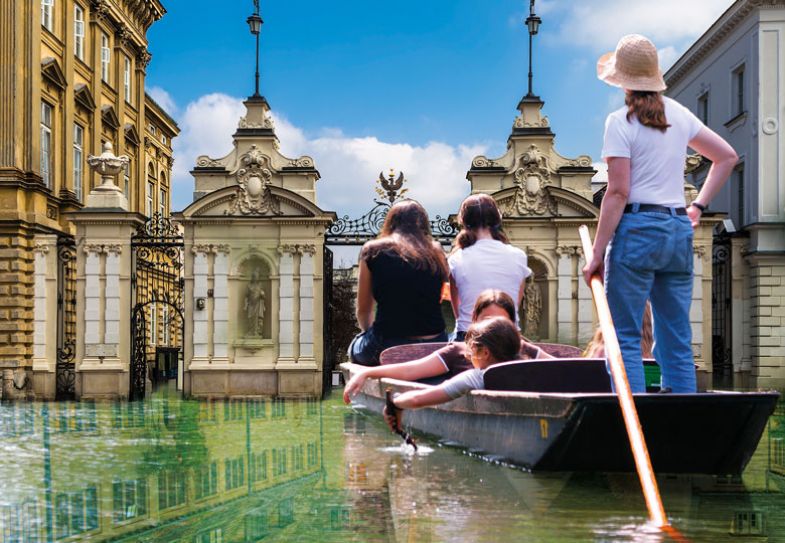Sun, sea and separation
Having never been to Australia, I had real doubts as I set off for a two-year postdoctoral post in Perth in 2001. After eight years in the north of England, I was more concerned with what I was leaving behind than where I was going. But, having worked several casual cafe jobs during my PhD, I would have moved anywhere to be paid to do research – especially somewhere warm, sunny and affordable.
Sure enough, when I arrived, the culture shock of working in Western Australia was more navigable than the intense loneliness. Even though I had known it would be hard, I still had not prepared myself adequately for the loss of friends and family, and I quickly learned to never again underestimate the importance of sharing my life with other people.
Yet the weather in Western Australia was every bit as far removed from the north of England’s as I’d hoped, and I loved the sense of freedom to take risks and reinvent myself. Conscious that I was only in a two-year post, I learnt sea kayaking, snorkelling and the joys of cycling. I filled my weekends with camping, wild swimming, photography, hiking, barbecues and making new friends. My car was permanently full of hiking and snorkelling kit and I was in equal measure terrified of all the insects and animals that could easily kill me and desperate to see and experience as much as possible.
I did some work too, though probably not as much as I should have. I suffered post-PhD writer’s block for months, so I threw myself into data collection, which meant participating in numerous environmental campaigns and using these as justification to visit beautiful old-growth forests, coral reefs and biodiversity hot spots. Realising this, my family and friends soon offered to join me, and I have fond memories of epic trips across the vast, treeless Nullarbor Plain in a tiny car with my brother and sister-in-law, snorkelling on the Ningaloo Reef World Heritage site with Mum, and watching the sunrise over Uluru, riding pillion on a Harley-Davidson motorbike with Dad.
My voice picked up an Australian lilt and my skin an Australian tan. I loved living in Perth and tried to stay. However, my lack of publication productivity and Australia’s much smaller university sector frustrated my job search. As the clock started to run down on my work visa, I reluctantly realised I had to leave. But I avoided leaving for as long as I could, staying in Australia until the very last day possible.
It was a difficult homecoming. I arrived in February and lodged with my mum. I was broke, cold, unemployed and strangely disoriented. All I saw was a wet, grey, dark England and I hated it. It took nine months to secure an academic post and, in the meantime, I returned to cafe work, peeling thousands of potatoes.
After a few years, though, I was finally happy to be back home. Reconnecting with family was joyous and our celebrations have since taken on new meaning. In the UK, I have benefited from greater career opportunities, funding possibilities and access to Europe. And I worry how increasing expectations of academics to repeatedly uproot their lives and move across the globe disrupts vital support networks and the stable structures of our personal lives.
While I will always hanker to be back in that moment and place where everything seemed fun, sunny and possible, I feel privileged that I am near family and have a deep-rooted sense of belonging.
Jenny Pickerill is professor in environmental geography at the University of Sheffield.
Having my pretzel and eating it
At the height of the pandemic, I resigned from my dream tenure-track job at a cosy liberal arts college just outside the very liveable (and still relatively affordable) city of Pittsburgh for an unknown future in Stuttgart, Germany.
My family and non-academic friends were enthusiastic. Sure, my partner and I were moving far away, but things had worked out well for us in previous moves and no doubt this would be no different. My academic friends, on the other hand, were troubled by the same questions as I was. Moving abroad sounds great (carpe diem), but, having spent so many years frantically swimming upstream to land a permanent position (and in philosophy, where the permanent job-to-PhD ratio is terrifying), did I really want to return to the insecurity that had plagued the early phases of my career? Why would I choose to leave behind the rare pleasures of supportive colleagues, bright students and, above all, job security?
Short answer, in the immortal words of Mr Spock, “The needs of the many outweigh the needs of the few.” My partner is also an academic and finding permanent academic positions for two humanities PhDs in the same city, outside of the sort of partner-hire gymnastics that only much larger institutions can sometimes pull off, is about as likely as landing Taylor Swift tickets on the day of the show.

My partner grew up in Stuttgart, and her retired parents could offer the sort of substantial (and highly affordable) inter-generational help with our young children that we had sorely missed as transplants in Pittsburgh. There was also a highly secure career as a public school teacher waiting for my partner, who had acquired certification before coming to the US for graduate school a decade before.
Countless other factors were also at play, such as quality of life and the social-political identities of each city and country. I speak German (albeit worse than my partner speaks English), green cards weren’t an issue, and I was energised at the prospect of reinventing myself. Even with the luxury of permanent employment, philosophy is no Shangri-La, and I had grown envious of friends who had bowed out of the academic rat race and apparently emerged more balanced and less deranged.
The first steps were easy. I changed the affiliation on my academia.edu profile to “independent” and applied for an administrative position at a local technical college that had nothing to do with philosophy but which I imagined I might be able to do well. It was incredibly refreshing to enter a job market where there aren’t hundreds of other qualified applicants for every position within 100 miles (and beyond).
However, 11 months in the post-tenure-track wilderness taught me that while you can take the philosopher out of the academy, you can’t take the academy out of the philosopher. After a series of twists of fate too numerous to recount here, I now have a visiting research and teaching position at the University of Stuttgart – where, to my good fortune, the odd blend of philosophy I specialise in (environmental, decolonial, classical German) happens to be taken seriously.
Some days, I feel like Pacino’s character in Godfather III: “Just when I thought I was out, they pull me back in.” But my place in the academy remains tenuous, and, depending on how grant and position applications go, may well have a looming expiration date. I also remain unsure whether I want to remain in academia in the long run, but I am grateful for the foothold I have. It gives me space to assess my identity (including my identity as “a philosopher”), my goals, and my prospects for achieving them. From here, my partner and I can, with a modicum of stability, navigate the many decisions we still face as a family.
But even if I do ride gracefully into the post-academic sunset, that road seems unlikely to lead all the way back to the US. We will never know what our lives would have been had we stuck it out in Pittsburgh, but the reasons that took us away still stand. And, for the time being, there is a familiar comfort, however twisted, in inhabiting this space of professional-existential indeterminacy, with which countless PhDs, especially in the humanities, are all too familiar. For now, I am content trying to have my pretzel and eat it too.
David Baumeister is senior research fellow in philosophy at the University of Stuttgart.
The end of the road?
I am a “third culture kid”. My parents have citizenships that are different from both each other’s and from mine. Growing up, I never spent more than a few years living in the same country, and since travel comes naturally to me, so does profession relocation.
I was born in the UK and returned there in 1998 as an undergraduate, stayed for my PhD, but then moved three more times: to Vienna and Los Angeles as a postdoc, and then to Sweden, where I took up my first faculty position in 2011. In October 2022, I moved again, joining the faculty of the Georgia Institute of Technology as a Georgia Research Alliance (GRA) Eminent Scholar, a programme I am proud to be part of.
This move, however, has been personally very different from previous ones. When I moved to Sweden, I was still in my twenties; this time, I was in my forties, with a husband and young child. Also, the parameters of an international move for senior faculty are very different: you have invested a huge amount of time establishing yourself in a system just to uproot yourself and start again. For me, this also involved building a new group from scratch, as well as learning a whole new funding system.
Everyone you talk to warns you this will be challenging, but facing the reality is still intense. However, it has been extremely rewarding at the same time. I have wonderful colleagues and a wonderful team, and I am part of a large, dynamic research ecosystem that includes not just the multiple excellent institutions in Atlanta and nearby, but also a broader community across the country.
My fields of computational biochemistry and biophysics are closely linked in the US, and the country is very strong in many subdisciplines that are important to me, including theory, astrobiology and protein science, providing a great environment for my research. Finally, like an increasing number of senior academics, my husband and I had spent many years living and working on different continents, and my new position brings us closer together.
Scientifically, I’m glad I was able to move so frequently. It has not been unheard of historically for academics to remain in one location for their entire careers, but this limited their exposure to other organisational structures, ways of thinking about science, and ways of doing research. A system that mandates mobility for professional success (as is increasingly the case) helps mitigate this problem. Each country I have worked in has taught me new things, broadened my horizons, exposed me to new cultures and made me a better scientist.

However, it is also important to acknowledge that being able to move so frequently is a privilege, both financially and personally. Doing so as an early-career academic with a young family or caring responsibilities is difficult, if not impossible. Further, while mobility brought my husband and me together, it tears many couples apart and is very disruptive, particularly when people most need stability to be able to build their families.
One of the lessons of the pandemic is just how much we can do online. And while virtual mobility does not reproduce the cultural benefits of physical mobility, it can help researchers who would otherwise have none at all to experience the benefits of professional mobility. Even more importantly, it creates opportunities for us as a scientific community to be more inclusive of such people, rather than penalising them for their personal circumstances.
As for me, I don’t know how many more moves I have in me. I feel as if I am already in the optimum environment, and since I lived in so many places when I was young, there is no particular “home” calling me back as I get older. Perhaps, for me, mobility is finally a thing of the past.
Lynn Kamerlin is professor and Georgia Research Alliance Vasser Woolley Chair in Molecular Design at the Georgia Institute of Technology.
The price of not fitting in
In my late twenties, I moved from Poland to the UK. Six years later, I returned to my home country. Both moves resulted from a careful deliberation of all pros and cons, and both were part of a longer-term professional and private life strategy. But moving away turned out to be much easier than moving back.
During the final year of my master’s in sociology at the University of Warsaw, I was awarded a three-month scholarship to study at the University of Oxford. It was highly competitive as, in the late 1990s, it was still unusual for people – especially young people – from behind the former Iron Curtain to travel abroad, particularly to the West. So I jumped at the chance.
After my Polish-funded scholarship ran out, I was offered a three-year doctoral fellowship at Nuffield College, which turned out to be one of the best, most formative experiences of my life, exposing me to top research, rich resources and a work culture based on competitiveness and striving for excellence. There was no culture shock. Life was fantastic and, with so many wonderful and smart people around me, I had a great sense of being in the right place. The fact that I had a fully funded studentship definitely helped, too, and I then managed to secure one of the most generous postdoctoral fellowships at Oxford, allowing me to stay for another three years.

But while the benefits were obvious, there was also a considerable cost. I had to live apart from my family, who I was very close with, and leaving a post-communist country to study at Oxford was understood to be a one-way process, so my family didn’t expect me to return.
However, after a couple of years in the UK, I started considering going back. It would have definitely been easier to be a mum in my twenties than in my thirties, but I felt I needed to wait to be in a permanent job in my destination country. Moreover, I believed it would be easier to raise children in my home country, close to my family. And I felt that with my qualifications and publication record, I could obtain a stronger position and better work-life balance in Poland than in any western European country.
But it turned out to be more complicated than that. It was difficult for people to understand that returning to Poland after starting a career at Oxford was a conscious decision and not an indication of some sort of failure. Poland didn’t – and still doesn’t – have a proper job market and mobility is extremely low. Moreover, my career trajectory was a challenge to how things were done here, in a very hierarchical system. I didn’t have a habilitation, so I wasn’t officially an “independent” researcher, but my publication record was better than those of a lot of senior people – most of whom were men. Hence, while some people were supportive, others were and still are openly hostile.
In addition, I was unprepared for how much more difficult it would be to do research in an underfunded environment where most people held more than one job to make ends meet. And all these years later, even though Polish academia has improved in many ways, I often feel that I am largely an outsider, whose values and work style do not fit with the dominant culture.
I’m used to criticism and rejection – I regularly go through evaluation for international publications and grant schemes – but the conflict here is more fundamental: it is about the values and goals of academic research. It is difficult not to get disheartened sometimes – luckily, though, there are more and more allies, and I owe them a lot.
It is difficult for me to relate to arguments that modern technology makes academic mobility obsolete. My studies and work at Oxford made me who I am as a scholar today – no online meeting can substitute for this experience. From my perspective, also as an evaluator in numerous grant and funding schemes, people who have taken the risk and spent time in another institution, preferably in a different country and culture, end up better researchers. Adventurousness and ambition are qualities that good research needs. So if I were to make choices about my own career again, I would still do a PhD and a postdoc abroad.
Most likely, I would still return to Poland, too. But it should be easier. I even ended up unemployed twice after coming home – immediately after I got a European Research Council grant and then again when it ended. I feel this was the price I paid for not “fitting in”.
Integration and reintegration are probably bigger problems in academia than people realise, and for countries such as Poland it is particularly important to come up with systematic solutions. Increased international mobility would undoubtedly increase the quality of research done here. But how can you advise young people to go abroad if you know they may be greeted with hostility when they return?
Natalia Letki is an associate professor at the Faculty of Political Science and International Studies and the Centre of Excellence in Social Sciences at the University of Warsaw.
The saffron-satsuma smog
As I write this, a surreal spike of air pollution drowns the Delhi area and my mind drifts back to December 2016, when the city experienced the most suffocating smog in decades, just as people were forced to stand in long queues outside banks after prime minister Narendra Modi demonetised certain banknotes.
In that same week, thousands of miles away, Donald Trump won the US presidency and Leonard Cohen died – and the globe felt as if it was trapped in a single nightmare. Having returned to India from the US four months earlier, it dawned on me that an impossibly muddled sense of the world was now my reality. I didn’t know which news mattered more to me: which was local and which was not. Our domestic helpers were struggling with bank accounts and electronic salary transfers as the contents of their wallets suddenly became worthless pieces of coloured paper. But the Trump victory also felt like an immediate disaster as my social media timelines filled up with shocked utterances by US-based friends and colleagues.
I wouldn’t have felt so muddled 15 years earlier. The Ohio where I had started my master’s in creative writing in 1999 had been as alien to me as I was to it: at church, an old lady had come up and touched my hair, saying she had never seen hair that black in her entire life. Doctoral study in post-9/11 New Jersey, on the other hand, felt in some ways like a homecoming, as the nearby chaotic craziness of New York City bizarrely evoked Kolkata, where I had grown up and been an undergraduate.
During my first job in southern Ontario, I quickly realised that being brown signified something very different in Canada as people found it hard to believe that I was actually a junior English professor rather than the owner of the convenience store around the corner. But moving to Stanford University a couple of years later, everything changed again as brown guys in Palo Alto were assumed to be Indian Institute of Technology alumni living on coffee and power bars while obsessing over how to raise venture capital from Sand Hill Road for their new AI start-up.

When I moved back to India to take up a professorship at the newly established Ashoka University, I realised that I’d missed the most happening 17 years in the country’s post-independence history. Mark Zuckerberg, whom I’d occasionally seen shopping in the Palo Alto farmers’ market, had created a platform that was bigger in India than in the US – as the US moved out of Facebook, India moved deeper into it. Moreover, the crop of Facebook natives (just beginning their mass migration to Instagram) that I was to teach in the new-age liberal arts university outside of Delhi were far more confident and articulate than my late-20th-century cohort had been in the colonially structured universities that still make up the largest stretch of India’s higher eduscape.
There was, by now, as much of America in Delhi as there had been of India in the Bay Area. As for the rest, the satsuma-toned glamour of Donald Trump’s populism melted strangely into Narendra Modi’s saffron, Hindu nationalist variety. Little did I know then that even when the Delhi smog cleared, the saffron tint would remain in the brains of so many, suffocating the new and exciting landscape of possibilities that had drawn me back to India in the first place.
Saikat Majumdar, a novelist and critic, is professor of English and creative writing at Ashoka University.
South-South-West
When I first moved to South Africa, I was often referred to as an “Indian from India” to distinguish me from South African Indians, whose families had settled there several generations ago. I was indeed an “Indian from India”, but I had moved to South Africa not from India but from the UK. The move from India to the UK was a typical one; the one to South Africa less so.
Like many upper-caste, middle-class, English-speaking Indians of my generation, I was oriented towards studying in the UK from an early age. As a philosophy graduate who was interested in pursuing continental philosophy, there were few options for me in India, so I successfully applied for a Chevening Scholarship to do an MA in philosophy and social theory at the University of Warwick.
Unlike the University of Delhi, however, philosophy at Warwick was almost entirely male and white, and I was soon weaned off the charms of discussing Hegel and Heidegger. Luckily, an interdisciplinary master’s introduced me to sociology and, more importantly, to feminist studies. I stayed on at Warwick to do a PhD in sociology, also on a funded research fellowship, and then got a permanent lectureship in sociology at the University of Nottingham.
It seemed obvious that I would be in the UK for the long haul. As well as my job, I had built professional networks, friendships and communities there. But I also had a partner who suffered the worst consequences of academic precarity. Five years on from his doctorate, he finally secured a job – at the University of Johannesburg. I was pregnant with twins, so rather than live on separate continents, we decided to move to South Africa, with the idea of returning to Nottingham should things not go to plan.
In the event, some of it went to plan and some of it didn’t. I obtained a job at my institution of choice, the University of the Witwatersrand (Wits), but my relationship didn’t last. Still, I decided it was probably wiser to co-parent the twins than to return to Nottingham as a single parent.

Academically, Wits was transformative for me. My classroom was almost entirely black/African and, unlike in the UK, I was not the only person of colour in my department – far from it. It was also intellectually vibrant in ways that the UK had stopped being, under pressures to perform and show impact. But I was still a foreigner in a place where most faculty (even if from elsewhere) were Africanists. And there were some expectations to orient my research, which had been squarely on India, toward South Africa.
My migrant trajectory turned out to be an asset, though, as I set about building South-South comparisons and collaborations across India and South Africa. I was also well placed to speak to new imperatives to decolonise and internationalise global higher education. In fact, being familiar with distinct academic ecosystems across the North and the South, I was an ideal native.
Migratory trajectories tend to move from the South to the North – as mine initially did – for better opportunities and all sorts of capital gain. I landed in a locale that I never intended to be in and still don’t belong to, and I took up this invented identity category for professional advancement. Less cynically, a decade spent in Johannesburg has shaped my scholarship and person in fundamental ways. It forced upon me new, fresh and difficult questions, from debating longstanding (colonial) comparative frameworks to interrogating newer buzzwords, such as decolonisation.
There is intimacy and distance in all migratory experiences, but perhaps these are felt more sharply when one moves across crisis-ridden, chaotic Southern settings.
Srila Roy is professor of sociology at the University of the Witwatersrand.
London calling
After completing my doctorate in the early 2000s, continuing lectureships were thin on the ground in the UK, and I felt trapped in a cycle of precarious short-term contracts. So when a research group working on research evaluation and policy at the Australian National University in Canberra offered me a three-year fellowship, I jumped at the chance.
While I had plenty of teaching experience, a fellowship offered the opportunity to focus on research and publishing – and to spend half my time on consultancy work with external funders. The ultimate goal was to secure a continuing position somewhere – anywhere! – and a strong publication record was essential.
My father had died shortly before I completed my doctorate, and my mother had passed away 20 years previously, so I had no family ties to bind me to the UK. My fiancé (now my husband) lived in London, but he was very supportive and joined me in Canberra after two years.
That was just as well. I was not prepared for the extent of the culture shock and loneliness I initially experienced even without a language barrier to contend with. That is why I have deep admiration, respect and empathy for colleagues and students who migrate to the UK. This international mix enriches the teaching and learning experience for all and brings depth and breadth to our research endeavours, but I know it isn’t always easy to adapt to life abroad.

In my case, being immersed in another culture was also a reality check for my thinking about the centrality of the UK (and Europe) in the world and the higher education sector. For example, our national obsession with the Research Excellence Framework and the way it defines our thinking about impact are laughably insular and parochial in a global context.
Parochialism can also infect teaching. In my final year in Australia, I lectured on classical sociological theory. Being on the other side of the world, I felt compelled to broaden the incongruent, received “pale, male, stale” canon of Durkheim, Marx and Weber to include non-European, non-white, non-male voices. I included W. E. B. Du Bois for a contemporary black American perspective and Marianne Weber for a female viewpoint, and I used seminars to help students reflect on issues in modern Australasian society and to consider Indigenous perspectives.
A bonus of being in Australia was that I became adept at winning modest travel grants, especially to coincide with coming home for Christmas and New Year. A special memory is my first return trip from Australia, my overhead locker crammed with kitsch Australian Christmas gifts. The Qantas flight began its descent over London on a frosty December morning, the sunrise glittering on the Thames, to the soundtrack of The Clash’s London Calling on the inflight entertainment system.
But as the initially envisaged three years in Australia turned into seven, my husband and I began to hear that call ever more loudly and frequently. Hence, we were grateful when I was approached by a research evaluation group at a university in London. I joined it at the age of 40 as a reader, my first continuing post.
Yet even back in the UK, my perspective has remained much more global than it was before I left. International collaboration on grants and publications has been essential in my research development, creating more relevant and higher quality outcomes. My Australian experience has also made other researchers and research users interested in collaborating with me, leading to work with partners in over 20 countries.
So while it’s good to be home, I wouldn’t have missed Australia for the world.
Claire Donovan is research professor of higher education at the University of Greenwich.
Register to continue
Why register?
- Registration is free and only takes a moment
- Once registered, you can read 3 articles a month
- Sign up for our newsletter
Subscribe
Or subscribe for unlimited access to:
- Unlimited access to news, views, insights & reviews
- Digital editions
- Digital access to THE’s university and college rankings analysis
Already registered or a current subscriber? Login
